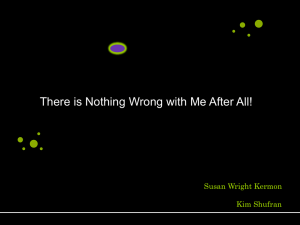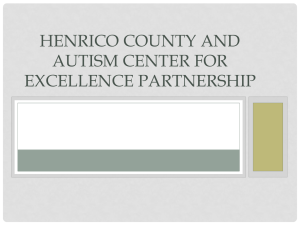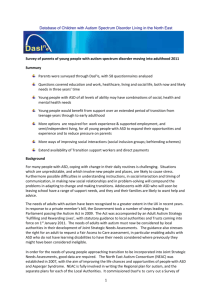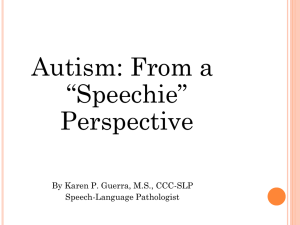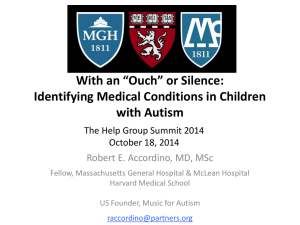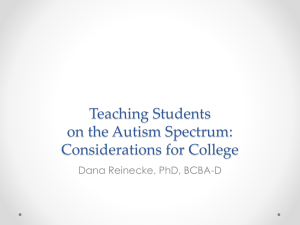Attachment - Bexley Local Offer
advertisement
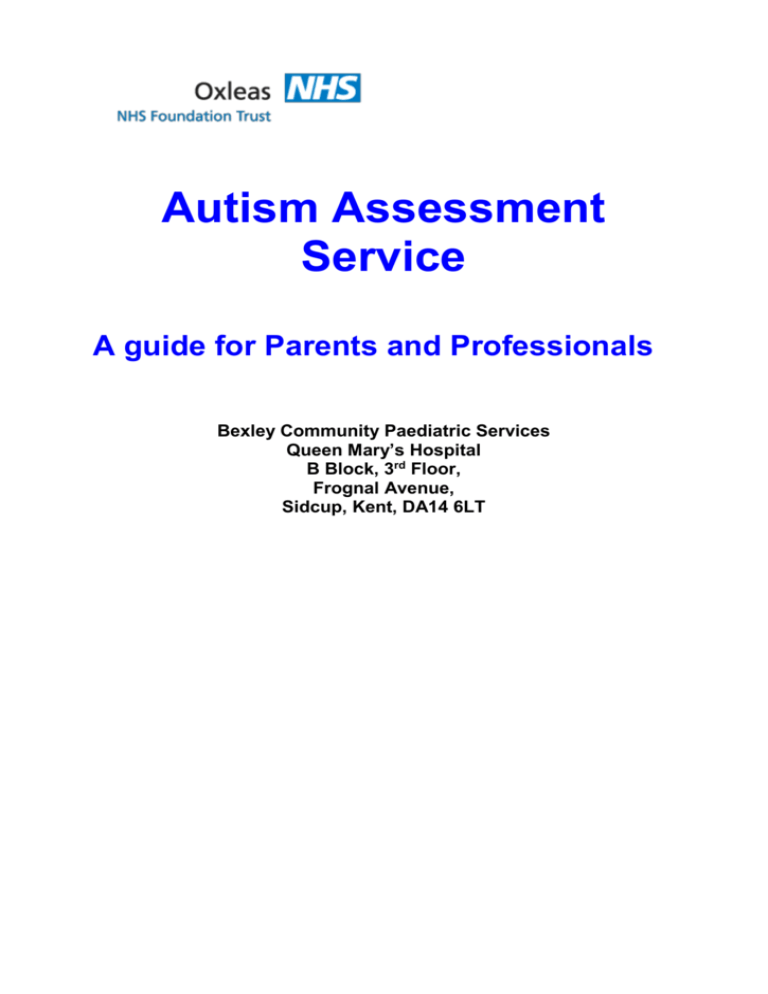
Autism Assessment Service A guide for Parents and Professionals Bexley Community Paediatric Services Queen Mary’s Hospital B Block, 3rd Floor, Frognal Avenue, Sidcup, Kent, DA14 6LT Bexley Autism Assessment Service Introduction Your child has been referred to our team because there is a concern that he or she may have social/behaviour traits which can be associated with an autistic spectrum disorder (ASD). The assessment process helps us to understand a child’s profile of strengths and needs, in order to support them most effectively. The earlier that assessment takes place and a diagnosis is made the better the chances of a child receiving appropriate help and targeted support. This leaflet explains the next steps in making a diagnosis. What is Autism Spectrum Disorder (ASD)? Autism Spectrum Disorder (ASD) is a complex developmental disorder that is life-long. It affects a child’s social interaction, social communication, imagination and play. Abnormal, rigid and repetitive behaviours are also common. Children and adults with autism have difficulties relating to others in a meaningful way. Their ability to make friends is impaired as is there capacity to understand the feelings and emotions of others. The degree of disability ranges from mild to severe. What is the role of the Autism Assessment Service? The diagnosis of ASD is made by a multi-agency team, supported by information drawn from all those involved with the child, such as parents, Speech and Language Therapists, Teachers, Specialist Teachers and Educational Psychologists. In this way every aspect of the child’s strengths and difficulties are taken into account when making a diagnosis. In Bexley, following national guidelines, there is a multi-agency assessment service (AAS), headed by a Consultant Community Paediatrician experienced in diagnosing ASD. The core members of the AAS include: Consultant Community Paediatricians Specialist Speech and Language Therapists Specialist Educational Psychologists Specialist Clinical Psychologists What happens when my child is referred to the Autism Assessment Service? When a child is referred for investigations into possible ASD and this referral is accepted by the Community Paediatrics service, with your agreement, questionnaires are sent to parents/carers and to your child’s school/nursery, to ensure that we have the most comprehensive picture about your child’s social functioning in a range of settings. Medical Assessment When all the necessary information is received, your child will be seen within 12 weeks for an initial medical appointment by one of the medical team (Paediatrician). Further information will be gathered around your child’s medical and developmental history, from birth to the present day. Your child will also be examined and developmentally assessed. Blood tests may be ordered, with parental consent, if thought appropriate, so that other conditions can be considered/ruled out. From this appointment, referral to appropriate support services can be made, if not already in place. Your doctor might plan for further medical review or discussion/assessment through the AAS as appropriate, in agreement with you. AAS Multi Agency Meeting Following medical assessment, if it is planned for further discussion/assessment through the AAS, the information gathered will then be discussed at the monthly AAS team meeting with Paediatricians, Speech and Language Therapists, Educational Psychologists, Clinical Psychologists and the Team Secretary present. At this meeting, if the referral meets our referral criteria, the Team will decide a plan of action in order to proceed towards the concluding diagnostic assessment. What happens next? There are currently no medical investigations or tests that will diagnosis ASD. Diagnosis is a comprehensive process that requires detailed information about your child’s early development and their present difficulties in different settings (e.g. at school/nursery and at home). For older children, we sometimes arrange to see parents without their child so that they can discuss their concerns more freely. We will also need to collect information from other professionals that know your child well, e.g. school/nursery staff. We will ask them to complete questionnaires and also to attend our concluding assessment session. Professional reports are always share with parents. A team member may observe your child in the nursery or school setting if the team feels appropriate. This is because social communication difficulties can differ in presentation between home and school. AAS Concluding Assessment A concluding assessment will take place at the Children’s Development Centre, Queen Mary’s Hospital, with at least two representatives from the core team present along with parents/carers. A representative from school is also invited to attend. Your child will complete the ‘Autism Diagnostic Observation Schedule’ (ADOS-2), a widely used semi structured, standardised assessment of communication, social interaction, play/imaginative skills and restricted and repetitive behaviours. You will be provided with information on what to expect when your final appointment is booked. This is followed by a meeting in which your child’s medical and developmental history, the findings of the ADOS 2 assessment, along with all of the information gathered will be reviewed and discussed with parents. Your child’s strengths and needs will be identified and if appropriate, a diagnosis of Autism Spectrum Disorder will be given. Other associated conditions such as Attention Deficit Hyperactivity Disorder (ADHD), motor co-ordination difficulties and Social Communication Disorder may also be discussed if appropriate. Within 4-6 weeks you will receive a full report of the assessment. With your permission, a copy will also be sent to your GP, school and any other relevant professionals. How long will the process take? We are currently receiving about a high number of new referrals per year and have a waiting list for assessment. It takes time for us to collect the information we need. In addition, we may need a longer period of observation if your child has just started a new school or recently moved into a class with a new teacher. Currently the average waiting time following discussion in the AAS team meeting to the concluding assessment session is 6-9 months. What happens after the diagnosis? The assessment team will: Discuss a management plan for your child with parents and other relevant professionals Provide information on the diagnosis if appropriate and signpost parents/carers to relevant support agencies and organisations Give parents the opportunities to raise immediate questions The Paediatrician will liaise with other health professionals where necessary and advise on any specific referrals that have been agreed to After the final assessment, you will receive a copy of our report. It is important to construct a profile for every individual who has an ASD diagnostic assessment, including strengths, skills, impairments and needs, in order to create a needs-based management plan. After you have had a chance to read it, a copy will then be sent to your general practitioner, your child’s school and any other professionals involved with your child. If the diagnosis is not straightforward or we are not sure, we will always be honest. While all children with ASD will benefit from an informed and supportive educational environment, not all will need specific intervention or additional support. Further Information For further information please contact: Vicki Lupton Team Secretary for the School Aged referrals Tel 0208 302 2678 ext 4748 Please see overleaf an outline of the core team members. NAMES AND CONTACT PHONE NUMBERS FOR SPECIALIST AAS TEAM MEMBERS: AAS TEAM LEAD CLINICIAN – Dr Thomas Jacob (Please address any enquiry to the Team Secretary Vicki Lupton, 0208 302 2678 x 4748 PAEDIATRICIANS Oxleas NHS Foundation Trust Dr Thomas Jacob – Consultant Community Paediatrician Dr Huma Iqbal – Consultant Community Paediatrician (under 5’s) Dr Sonia Shetty – Speciality Doctor in Paediatrics Queen Mary’s Hospital B Block, 3rd Floor, Frognal Avenue, Sidcup Kent DA14 6LT CLINICAL PSYCHOLOGIST Oxleas NHS Foundation Trust Dr Elizabeth Kilbey – Consultant Clinical Psychologist Dr Inga Klugkist – Highly Specialised Clinical Psychologist (0208 3022678 x 4748) SPECIALIST SPEECH AND LANGUAGE THERAPISTS Oxleas NHS Foundation Trust Olivia Owen Colin Williams Rachel Littlejohn Marion Yoxall Anne O’Donoghue Ann Lane (Woodside Clinic – 01322 521330) SENIOR EDUCATIONAL PSYCHOLOGIST Bexley Education Authority Shirley Moyse – 0208 303 7777 ext 4489 Civic Offices, 2 Watling Street, Bexleyheath Kent DA6 7AT TEAM SECRETARY Oxleas NHS Foundation Trust Community Paediatrics Queen Mary’s Hospital Vicki Lupton 0208 302 2678 x 4748 * Please address any enquiry to the Team Secretary
